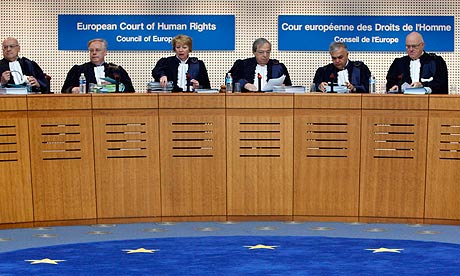Ministers 'could get powers to overrule European court of human rights'
A commission set up by the government to examine ECHR reforms has floated the idea of allowing ministers to strike out court rulings

The European court of human rights' could have its powers downgraded by handing ministers across the continent the right to strike down rulings under plans being examined by the British government.
A commission set up by the government to examine reforms to the Strasbourg-based ECHR has floated the idea of handing ministers and parliamentarians on the Council of Europe the right to override rulings of the court.
The suggestion by the commission on a Bill of Rights, in a letter to Nick Clegg and Kenneth Clarke, was published as ministers made clear that the court needed to undergo wide-ranging reforms. Clarke, who is the most pro-European Tory member of the cabinet, told MPs on Wednesday there were "important decisions" to be made about the workings of the court.
Sir Leigh Lewis, the chair of the Commission on a Bill of Rights, showed the depth of thinking about the future of the court when he said that the 2010 Interlaken Declaration on the future of the ECHR raised the possibility that other institutions of the Council of Europe could qualify the European Convention on Human Rights. The 47-strong Council of Europe, which is separate from the EU, is the continent's human rights watchdog. Its European court of human rights' enforces the European Convention on Human Rights.
In his letter, Lewis wrote of the proposed change: "This could allow the effect of a court decision to be overridden if such was the will of the parliamentary assembly or committee of ministers, or perhaps of both acting collectively. A variant of this approach might be a power in the committee of ministers to determine that a court judgment should not be enforced if it considered that that course of action was desirable and justifiable in the light of a clear expression of opinion by the relevant member state's most senior democratic institution. Another variant could be a requirement in respect of proposed ground-breaking findings of violations for the court first to consult the other Council of Europe institutions and for the court to take a collective expression of opinion into account."
But Lewis, who said that one member of his commission had insisted that a proposal on guaranteeing the democratic legitimacy of the court must be included in the interim advice to ministers, warned that his proposal had not been yet fully considered. He also said there were critics.
"Those opposed to this concept argue that any possibility of override is fundamentally inconsistent with the rule of law inherent in the convention system and with the concept of the convention as a charter of fundamental rights and freedoms. They ask how, if a right or freedom is fundamental, it can be right to allow any legislature, however democratic, to override it.
"They point, for example, to the fact that there are examples in history of discriminatory laws being passed by democratically elected assemblies. They note that the ECHR as a judicial body is an essential protection against majorities voting to discriminate against minorities."
Comment: I am disgusted that The so-called Guardian is printing such rubbish.

1 comment:
Amazing, the ends a supposedly democratic government will go to to stop a certain sector of its population from voting!
Post a Comment